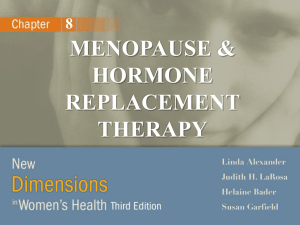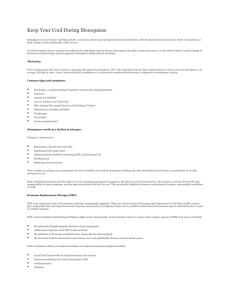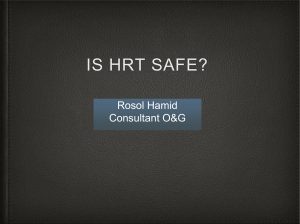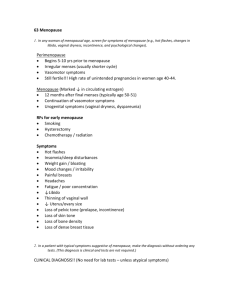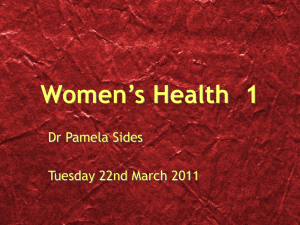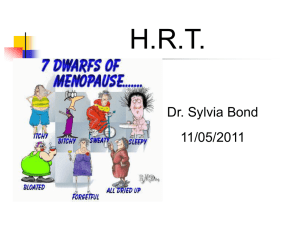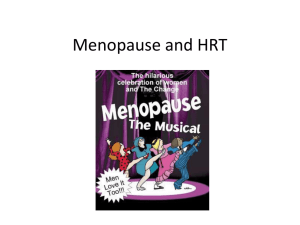Hormone Replacement Therapy (HRT) and the Menopause What is
advertisement
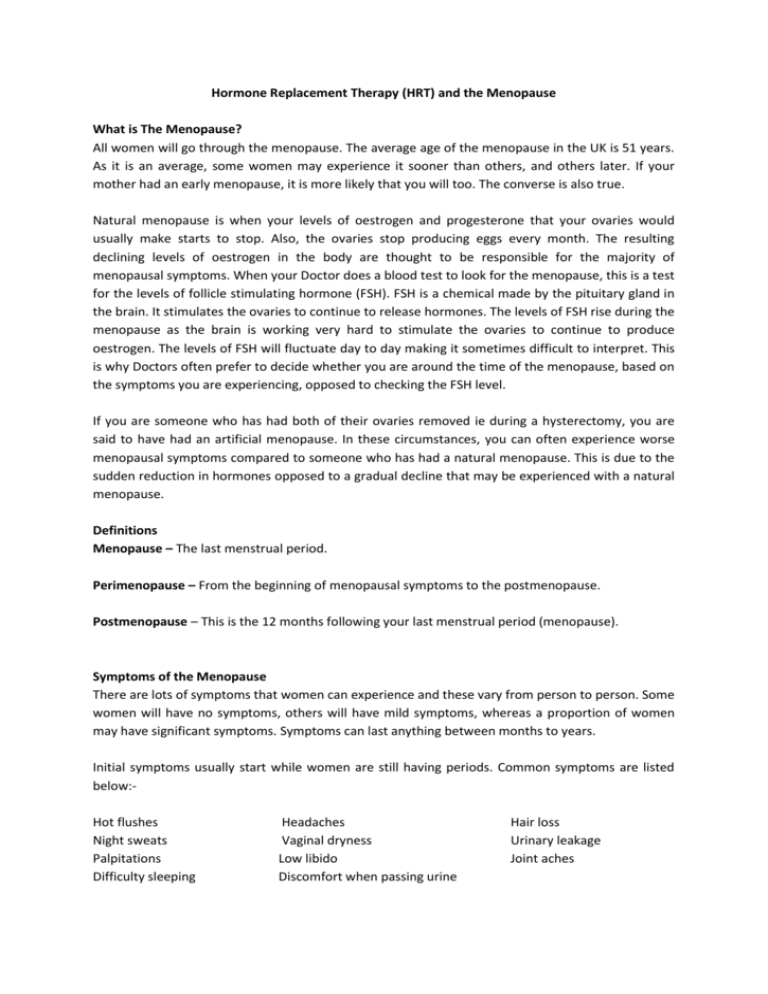
Hormone Replacement Therapy (HRT) and the Menopause What is The Menopause? All women will go through the menopause. The average age of the menopause in the UK is 51 years. As it is an average, some women may experience it sooner than others, and others later. If your mother had an early menopause, it is more likely that you will too. The converse is also true. Natural menopause is when your levels of oestrogen and progesterone that your ovaries would usually make starts to stop. Also, the ovaries stop producing eggs every month. The resulting declining levels of oestrogen in the body are thought to be responsible for the majority of menopausal symptoms. When your Doctor does a blood test to look for the menopause, this is a test for the levels of follicle stimulating hormone (FSH). FSH is a chemical made by the pituitary gland in the brain. It stimulates the ovaries to continue to release hormones. The levels of FSH rise during the menopause as the brain is working very hard to stimulate the ovaries to continue to produce oestrogen. The levels of FSH will fluctuate day to day making it sometimes difficult to interpret. This is why Doctors often prefer to decide whether you are around the time of the menopause, based on the symptoms you are experiencing, opposed to checking the FSH level. If you are someone who has had both of their ovaries removed ie during a hysterectomy, you are said to have had an artificial menopause. In these circumstances, you can often experience worse menopausal symptoms compared to someone who has had a natural menopause. This is due to the sudden reduction in hormones opposed to a gradual decline that may be experienced with a natural menopause. Definitions Menopause – The last menstrual period. Perimenopause – From the beginning of menopausal symptoms to the postmenopause. Postmenopause – This is the 12 months following your last menstrual period (menopause). Symptoms of the Menopause There are lots of symptoms that women can experience and these vary from person to person. Some women will have no symptoms, others will have mild symptoms, whereas a proportion of women may have significant symptoms. Symptoms can last anything between months to years. Initial symptoms usually start while women are still having periods. Common symptoms are listed below:Hot flushes Night sweats Palpitations Difficulty sleeping Headaches Vaginal dryness Low libido Discomfort when passing urine Hair loss Urinary leakage Joint aches What to Expect in Terms of Periods Periods will alter around the time of the menopause. As the menopause approaches, you may miss the occasional period. It is not unusual for periods to be spaced further apart. You may go several months without having a bleed. Periods will eventually stop. Sometimes women can experience heavy bleeding or bleeding in between periods around the menopause. Often this is nothing to worry about, but as occasionally this can be a sign of cancer of the womb, it is sensible to consult your GP to discuss. How Long Is Contraception Needed For? Under 50 years – If your last period was under the age of 50yrs, it is advised you use some form of contraception for 2 years following your last period. Over 50 years – If your last period was over the age of 50yrs, it is advised you use some form of contraception for 1 year following your last period. Do I Need Any Treatment for the Menopause? No, not necessarily. If you are someone who is over 45yrs and going through the menopause, symptoms can often be managed with diet, exercise and reducing caffeine levels. If however, you are under the age of 45yrs it is sensible to make an appointment to see your GP to discuss whether hormone replacement therapy (HRT) may be indicated in your case. Oestrogen is a hormone which helps keep bones healthy and strong. We know that if you have an early menopause (under the age of 45yrs) you are at risk of developing weak bones. This is called osteoporosis. This is why sometimes your Doctor may recommend taking hormone replacement therapy and it is important to talk to them about this. Conservative Treatments We know that women who eat healthily, limit their caffeine intake, do not smoke and exercise regularly manage better with menopausal symptoms. This may be all that is needed in your case. Hormone Replacement Therapy (HRT) In some women, menopausal symptoms can be significant and conservative measures alone might not be enough. In these cases we are likely to discuss other methods, such as hormone replacement therapy and alternatives to hormone replacement therapy which is included below. As the majority of menopausal symptoms are believed to be due to declining levels of oestrogen, it would make sense that HRT works by replacing this ‘lost’ oestrogen. The HRT that is prescribed after an artificial menopause (hysterectomy) would usually contain only oestrogen. However, the HRT that is used after a natural menopause would combine both oestrogen and progesterone. The progesterone is needed to prevent the lining of the womb thickening which could give risk to abnormal cells which could if left alone could change into cancer. HRT is available in a number of different formulations, to include tablet form, patches, or a daily gel. Some women even use the mirena coil (refer to this section on website) to provide the progesterone component of their HRT. If you are prescribed combined HRT (oestrogen and progesterone), for at least the first 12 months, you will be given a sequential HRT preparation which will allow you to have a monthly period. When this 12 months has passed it is usual to be swapped onto a continuous combined regime which is designed to stop your monthly periods. Benefits of HRT Relief of menopausal symptoms Prevention/treatment of osteoporosis Risks of HRT Each woman’s individual case must be taking into consideration when prescribing HRT. We know that HRT is riskier in women who smoke, or who have other evidence of cardiovascular disease, such as high blood pressure (hypertension), chronic kidney disease, diabetes, and previous heart attacks (myocardial infarctions) and stokes. Your Doctor will weigh up the risks versus the benefits when discussing. Breast cancer Current opinion is that for combined preparations of HRT, there is an increased risk of breast cancer. This is thought to only come into play after the woman has been taking the HRT for more than 5 years. After 5 years of stopping HRT, your risk of breast cancer returns to what it would have been as if you’d never been on HRT. Doctors are likely to be more cautious if you have a family history of the disease. Cardiovascular Disease It is much less clear what effect on cardiovascular health HRT has. The consensus is that for oestrogen only HRT, there is no increased risk of heart attacks/strokes. For combined HRT preparations, the increased of cardiovascular disease is thought to be present if you start HRT 20 years after the menopause, and this risk is present for the first year of use only. Venous Thromboembolism This includes blood clots in the legs (deep vein thrombosis) and blood clots in the lungs (pulmonary embolism). Taking HRT increases your risk of developing a blood clot. This is thought to be at its highest during the first year of use. Ovarian Cancer The evidence here is inconclusive. Some studies have shown increased risks, whereas others have shown no increased risk. Endometrial (Womb/Uterine) Cancer Risk is increased when on continuous preparations of HRT. Risk is also increased if you are on a sequential preparation for HRT for more than 5 years. Contraindications to HRT Use There are a number of reasons why it would be considered unsafe to start a woman on HRT which are listed below.... Undiagnosed vaginal bleeding If your periods are irregular, or if you are having bleeding with sexual intercourse or in between periods, this needs to be investigated before HRT can be considered. Make an appointment with your Doctor to discuss this further. Current or recent blood clot (venous thromboembolism) or heart attack (myocardial infarction). Also recurrent thromboemboli. Pregnancy Active liver disease Breast/endometrial cancer Blood clotting disorder (thrombophilic disrorder) When to See Your Doctor When Taking HRT When initially started on HRT, you will usually be asked to come for a review after 3 months to assess how you’re getting on with it and to check your blood pressure. 3 months is really the shortest period of time needed to gauge the effect the HRT it has had. If all is well, you will then be reviewed 12 monthly. Alternatives to HRT Some women do not want to commence HRT but prefers to discuss other options. These are listed below. Clonidine This is a medication originally introduced as a blood pressure medication. Now, it is no longer used for this reason. Clonidine does not contain hormones and is not a form of HRT. Clonidine is the only oral medication that is licensed to be prescribed by Doctors as an alternative to HRT. Clonidine gives varying results – the success rate has been quoted at around 50%. It is taken every day and thought to help target hot flushes. Selective Serotonin Uptake Inhibitors (SSRIs) These medications are often used in people with anxiety and depression. They do not have a license for hot flushes, but some evidence has shown that they can be helpful with menopausal hot flushes, and Doctors are able to prescribe them as an offlicense indication. Vaginal Oestrogens These are used in women who predominantly complain of urinary leakage, discomfort when passing urine or vaginal dryness. They are applied locally to the vagina to increase oestrogen levels. Very little preparation is able to enter the circulation this way, so there aren’t the same risks as taking HRT associated with it. Replens/sylk These are non hormonal vaginal moisturisers which are used for vaginal dryness. Similar preparations can be purchased over the counter from your local chemist. Complimentary Therapies These include herbal preparations such as black cohosh, red clover and evening primrose oil. The above have been marketed as menopausal remedies for hot flushes, but it is important to remember that just because they are marketed as ‘natural’ this does not mean that they are free of side effects and that they are safe to take. Their long term safety has not been properly assessed and a number have been identified to give risk to serious side effects ie. liver damage with black cohosh. Doctors generally do not advocate their use. How To Arrange An Appointment Appointments can be made via telephone or online if you have registered for online access. Although all GPs are qualified to discuss matters surrounding the menopause, there are a number of GPs who have a special interest in this area who you may prefer to book with. They are listed below. Dr Kerr, Dr Hobbs, Dr Wilson, Dr Jones, Dr Simpson Useful Resources http://www.menopausematters.co.uk

